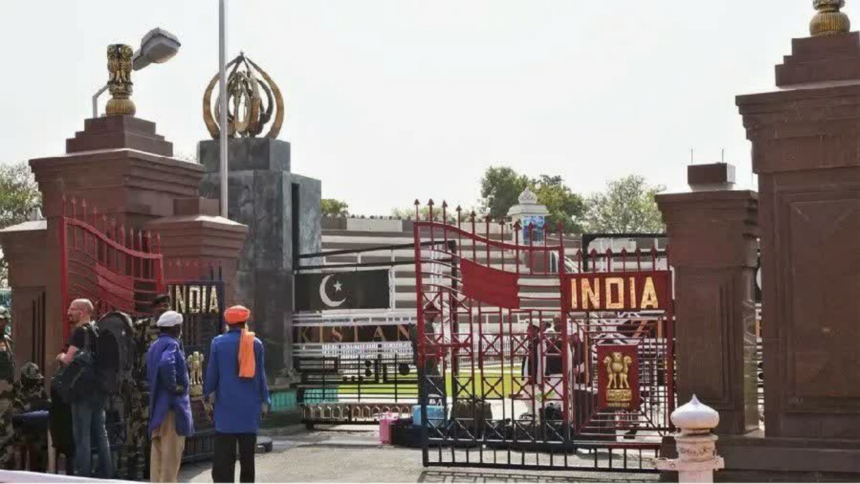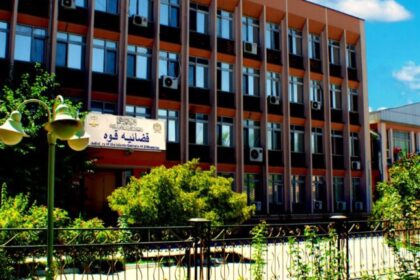RASC News Agency: The fragile remnants of Afghanistan’s economy have suffered yet another devastating blow as Pakistan abruptly closed the Attari–Wagah transit corridor, one of the most vital arteries for regional trade. The closure, occurring amid escalating military and diplomatic tensions between Islamabad and the Taliban regime, has effectively frozen all commerce between Afghanistan and India — underscoring both the collapse of regional trust and the Taliban’s inability to defend Afghanistan’s economic interests.
According to The Times of India, which broke the story on Saturday, October 26, Pakistan has tightened its border restrictions to a degree unseen in recent years. Freight traffic has been completely halted, and Afghanistani truck drivers have been denied passage through Pakistani territory. Pakistani transporters have since replaced them, resulting in what Indian media described as a “complete paralysis of cross-border trade.”
The suspension has plunged Afghanistan’s exporters into chaos. Khwaja Abdul Rahim Siddiqi, a prominent exporter of fruits and dried goods, told Indian outlets that the Taliban’s failure to maintain even the most basic diplomatic relations with Pakistan has crippled the country’s trade networks. “Hundreds of tons of Afghanistani goods — pomegranates, raisins, and almonds — are now rotting at the border,” he said. “Each passing day deepens our losses, and the authorities in Kabul are silent, indifferent, and invisible.”
Economic observers say Pakistan’s decision is not merely logistical but deeply political and strategic. Many analysts suspect that the closure was orchestrated by Pakistan’s Inter-Services Intelligence (ISI) agency as both a punitive measure and an intelligence maneuver — designed to weaken the Taliban’s bargaining power while maintaining leverage over border dynamics.
Yet, while Pakistan consolidates its geopolitical advantage, the Taliban leadership in Kabul remains conspicuously preoccupied with ideological policing and repression rather than economic diplomacy. Since their return to power in 2021, the group has dismantled the institutions that once facilitated regional trade cooperation and replaced them with unqualified loyalists focused more on enforcing dress codes and silencing women than negotiating trade agreements.
“Afghanistan under Taliban control has lost its political sovereignty and its economic agency,” said a Kabul-based economist, speaking on condition of anonymity for fear of reprisal. “Pakistan closes a border, and millions of Afghans lose their livelihoods — yet Kabul remains mute. This is not governance; it is submission.”
The closure of the Attari–Wagah corridor comes as border clashes intensify between Taliban fighters and the Pakistani military in several provinces, including Kandahar, Paktika, and Khost. The most recent escalation occurred when Pakistani airstrikes targeted Barmal district in Paktika, killing at least seven civilians — among them three Afghanistani cricket players — and injuring several others.
While Islamabad justified its attacks as retaliation for cross-border assaults, the Taliban’s reaction has been predictably muted. Their spokesmen in Kabul offered no substantial condemnation, continuing a familiar pattern of silence whenever Pakistan violates Afghanistan’s airspace or territorial integrity. This silence, critics say, reflects the Taliban’s chronic dependency on their former patrons in Rawalpindi and their reluctance to confront Pakistan militarily or diplomatically.
“This regime speaks loudly against women cutting their hair but remains utterly voiceless when Pakistan bombs its citizens,” said a political analyst in Kabul. “It exposes where their loyalties truly lie — not with the Afghanistani people, but with those who nurtured their rise.”
The Attari–Wagah corridor has long served as a crucial conduit for Afghanistan’s agricultural and manufacturing exports to Indian markets. The current blockade has halted the movement of goods valued at millions of dollars and threatens to devastate an economy already teetering on the brink of collapse.
Local traders warn that without immediate diplomatic intervention, Afghanistan could lose its last viable trade channel with South Asia. “Our trucks are stuck at checkpoints, our fruits are spoiling, and our contracts are breaking,” said Siddiqi. “The Taliban talk about ‘Islamic governance,’ but they cannot even guarantee safe passage for a truckload of pomegranates.”
Indian trade associations have voiced concern that Pakistan’s decision is part of a broader geopolitical calculus aimed at undermining India’s trade influence in Afghanistan. A senior Indian trade official, speaking to RASC, described the situation as “an engineered blockade designed to suffocate Afghanistan economically and to remind the Taliban who truly controls their borders.”
Afghanistan’s economic woes under Taliban rule have deepened beyond precedent. With international aid nearly evaporated and sanctions isolating the regime, the country is now gripped by hyper-unemployment, food insecurity, and a liquidity crisis. Analysts note that Pakistan’s closure of the Attari–Wagah route has exposed not just an economic vulnerability but a political reality: the Taliban’s Afghanistan is a landlocked state held hostage by its neighbors.
“Afghanistan’s trade routes used to be its arteries of survival,” said Dr. Latif Hamdard, an economist at the South Asia Policy Institute. “Now, they are pressure points controlled by foreign powers — and the Taliban have handed those powers the scalpel.”
Despite recurring claims of “self-sufficiency,” the Taliban government has failed to generate meaningful revenue streams or rebuild Afghanistan’s export base. Instead, corruption within customs offices and smuggling networks — many of which are operated by Taliban commanders themselves — have become the primary means of income, deepening the country’s dependency and poverty.
As the Attari–Wagah corridor remains sealed, thousands of Afghanistani farmers, transporters, and traders stand to lose their livelihoods. Pomegranates rot on trucks, warehouses fill with unsold almonds, and markets across Kandahar and Jalalabad grow emptier by the day. For many, the closure is more than a political act — it is a death sentence for an economy built on fragile exports and forgotten promises.
“The Taliban’s silence over Pakistan’s aggression and their failure to protect Afghanistan’s economic arteries represent a betrayal of national dignity,” said an Afghanistani business leader in Kabul. “This is not an administration defending its borders; it is a regime defending its privileges.”
As Afghanistan sinks deeper into diplomatic isolation and economic paralysis, the Taliban continue to project an image of strength through fear — policing women, suppressing dissent, and silencing the press. Yet, beyond their propaganda, the reality is stark: a starving nation, a silenced people, and a regime that has traded sovereignty for survival.






